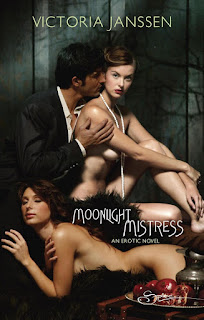I love historical romance, but even more I love historical science fiction and fantasy with romance, or romantic elements. There's something about the mix of flavors that draws me in; I get an extra buzz from the story when more than one genre element is present. I loved Colleen Gleason's Regency vampire-slayer novels (The Gardella Chronicles, beginning with The Rest Falls Away: The Gardella Vampire Chronicles

I think the main reason I love combined flavors is that mixing genres is a way to avoid the same-old, same-old of historical romance. The plot usually runs like this: hero and heroine meet, family/money/status/scandalous past/amnesia keep them apart, then they are brought together once more. For me, those plot complications become more compelling if the family issue is that a werewolf needs to marry another werewolf or he can't have werewolf children, or if the scandalous past is only because the heroine isn't human and doesn't have human standards of behavior. I don't know what to expect, and the reading experience becomes more exciting as a result.
From a marketing standpoint, cross-genre books can be a problem--how do you market the book? Is it a romance/erotic novel, or is it a paranormal? Should there be a clench on the cover, or a man turning into a wolf? Will the book be shelved in Romance on Science Fiction and Fantasy? Do the readers of the two genres have differing expectations, so in trying to please both, you please neither? For Moonlight Mistress, at least, this was less of an issue. As an "erotic novel" rather than a straightforward romance, I had a little more freedom in how the plot and relationships progressed. Though there are several romances in the novel, they proceed in different ways, and end at different stages: one clearly Happily Ever After, one on the brink of a marriage that's clearly only the beginning of the relationship, and a third, a ménage, still in the formative stages. Adding werewolves merely added a new flavor to the blend.
(This essay originated as a guest appearance at Romance Junkies.)
Related Post: Types of Paranormal Romance.
Romancing the Beast.
Why Werewolves?
Werewolves in Moonlight Mistress.




No comments:
Post a Comment